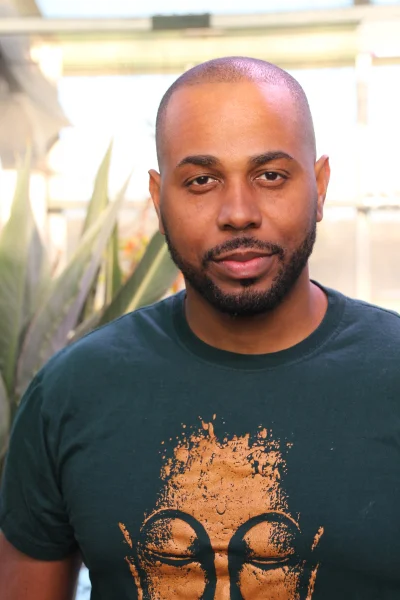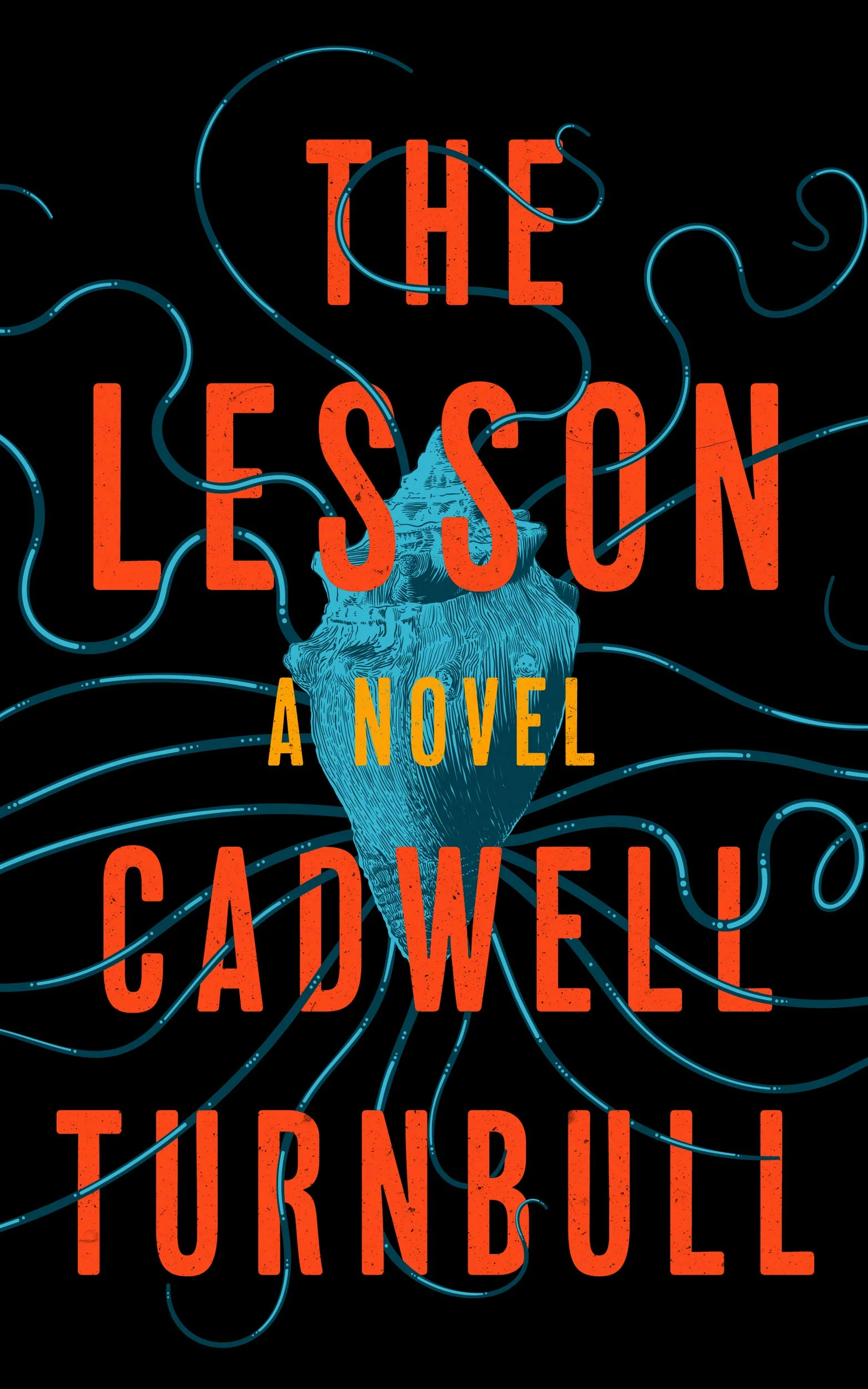In Cadwell Turnbull’s debut novel, The Lesson, the alien Ynaa arrive over the U.S. Virgin Islands and settle in St. Thomas. They offer medicine and clean energy technology in exchange for a short residency; they’re uninterested in colonization, still less in saving humanity from itself. They even manage to look perfectly human—or almost perfectly. Even so, the visit is unpleasant: Ynaa respond to the slightest perceived threat, even a barking dog, with lethal force. The Ynaa quickly join the ranks of St. Thomas’s long history of violent invaders.
That violence structures Turnbull’s novel, otherwise divided among a large St. Thomian cast of narrators, with each chapter capturing a different perspective on the Ynaa and especially their ambassador, Mera. A local professor finds historical evidence that Mera may have been on Earth much longer than she admits; his student, Derek, takes a job as her assistant and tries to be her bridge to the suspicious human population; Derek’s sister mourns a friend whose death was overshadowed by the Ynaa’s killing of a local teenager. One chapter, first published as a stand-alone story (“A Third of the Stars in Heaven”), follows Derek’s grandmother as she weighs the chance of life-saving Ynaa medicine against her religious convictions. Even the ambassador gets her say: as formidable and aloof as Mera seems to the humans, we quickly understand she is their best advocate—their only advocate—and maybe the only person who appreciates the history of power, anxiety, and reprisal the humans and Ynaa are recreating.
The Ynaa evolved on an ocean planet with little land mass, and thus an acute competition for resources among multiple sentient species. In this sense, the Ynaa echo the Virgin Islanders, whose archipelago was settled in competing waves of Ciboney, Arawak, then Carib natives, and finally European colonizers and their African slaves. The Ynaa’s ultraviolence is a sociological adaptation to interspecies competition—a gesture of absolute dominance—that Turnbull smartly sets against the history of brutal white reprisals for slave rebellions.
Turnbull’s light touch here is effective: the connection he draws between historical Caribbean slavery and alien occupation is firm and unsparing, but unsentimental. The fevered heroics of alien invasion stories and human resistance can be thrilling; sometimes, though, they read like a sleeper waking from a nightmare and re-litigating the dream, convincing themselves it (colonization, enslavement) wouldn’t happen to them, not that way. Turnbull is more interested in probing the complexities of resistance, what it means to answer violence with violence and what these cycles signify to occupiers and rebels alike.
“Harbour at St. Thomas” (1852), by Fritz Melbye.
Mera gives us a special insight into one rebellion, led by an Akwamu prince who escapes his slavers into the bush and summons his former subjects with tribal drums. This rebellion, Mera suggests, is less about the practical chance of liberation than the dignity the slaves see in reviving a power structure that is forever lost:
Siba argued with Mera every night. He wanted to leave for the bush. She urged him to reconsider.
“You’re asking me to betray my king.”
“Your king is dead. You don’t owe his son anything.”
“He is king now.”
“No, he is not. The land you once ruled is far away from here. He rules over nothing now but water-starved bush.”
The slave rebellion and the masters’ reprisals, like the human and Ynaa violence, is a complex social language, a series of bloody gestures enacted by groups to communicate power, rebut it, negotiate it. Rather than collapse his premise into a straightforward colonial allegory, Turnbull uses the Ynaa occupation to explore what social violence means to the communities that embrace or suffer through it, and whether we as individuals have anything to say about it. Some of the early critical comparisons of The Lesson to Octavia Butler can feel just a little gauche—black authors somehow always seem to be compared only to each other—but Turnbull’s fearless commitment to his novel’s ambivalence more than earns it. Like the Oankali in Butler’s Xenogenesis trilogy, the Ynaa press on humanity’s sore points, showing our ugliest instincts even where justice is on our side. How we’re loyal to symbols, dead kings, and histories, even more than to living people. Would-be peacemakers, like Derek, have to first reckon with these forces before they can find a new social language.
Derek, the novel’s main-est character, is a fascinating, difficult figure. Sci-fi readers have been trained up to root for the idealist: we immediately grasp that peaceful coexistence must be the only solution to escape the cycle of violence, and the more the St. Thomians warn Derek off from Mera and question his loyalties, the more he looks like the misunderstood outsider who’ll eventually be vindicated. But—is he right? The Lesson cannily builds Derek’s strength of conviction alongside his appalling naivete, reinforced by a near unanimous supporting cast. You get the sense that Turnbull wants Derek to reach some vindication just as much as we do, but is too honest to pave the way for him.
The recent Game of Thrones finale foregrounded this same ambivalence: how does a society locked into cycles of mass violence move into a stabler set of relationships? (Not convincingly, is apparently the answer.) Likewise in 2008, the Battlestar Galactica series finale dissatisfied many, arguably for the same failure to square the human and Cylon civilizations’ deep divisions with the series’ swift resolution. Raised as I was on the technocratic optimism of Star Trek: The Next Generation, the pathway to the United Federation of Planets, from our current moment of resurgent nationalism, mutual suspicion, white supremacist violence, mass shootings—and on and on—is murkier than ever. Like Derek, I want to get straight to that mutually affirming coexistence that feels so inevitaly the right answer.
But that’s not how it works, clearly. We may get there, but there’s a missing middle we haven’t worked out. Turnbull’s honesty here is important: the world we’d like to see, that we think is so obviously a better one, is hard to get to, because it leaves out the need for reckoning, symmetry, satisfaction that drives our sense of justice. It’s not a happy idea, but it is an exciting one, and it’s necessary to make that idealism achievable, one day. Maybe in the next generation.













Cadwell Turnbull's new novel — the first in a trilogy — imagines the hard, uncertain work of a fantastical justice.